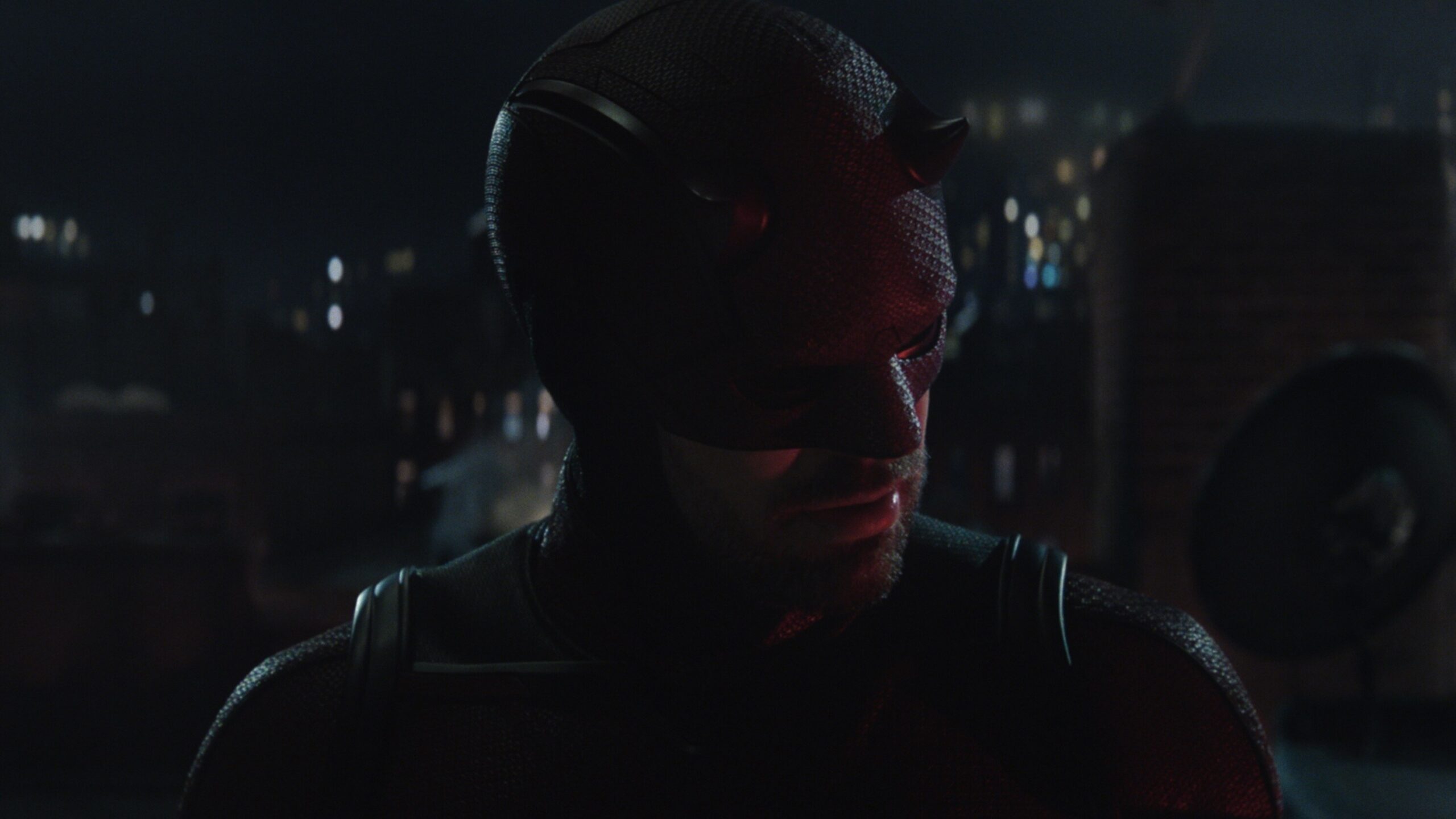Content warning: This review contains spoilers and mentions of violence.
Seven years after the original Netflix series ended, Daredevil returns, after making appearances in Spider-Man: No Way Home, She-Hulk, and Echo. The highly anticipated premiere of Daredevil: Born Again on Disney+ delivered a gripping blend of courtroom drama and thrilling action that has reignited the passion of Marvel fans. Returning from the original production, Charlie Cox, Vincent D’Onofrio, Deborah Ann Woll, Elden Henson, Wilson Bethel, Ayelet Zurer, and Jon Bernthal reprise their iconic roles with several fresh faces thrown into the mix—Margaret Levieva, Zabryna Guevara, Nikki M. James, the late Kamar de los Reyes, Michael Gandolfini, Arty Froushan, and Clark Johnson. From shocking character developments to a darker, more intense tone throughout, the first two episodes have set the stage for what promises to be a thrilling new chapter in the Daredevil saga.
The first episode, “Heaven’s Half Hour,” begins with the beloved trio Matt Murdock, aka Daredevil (Cox), Karen Page (Woll), and Foggy Nelson (Henson), reliving their familiar camaraderie during a night out at Josie’s Bar, a nostalgic callback to the original series. Matt has seemingly left his life as Daredevil behind, choosing peace over peril. However, the calm is short-lived when Benjamin Poindexter (Bethel), one of the standout villains from the Netflix series, orchestrates a sinister plan. Luring Foggy outside, Benjamin mercilessly shoots him from a rooftop, plunging Matt back into chaos.
Matt confronts Benjamin, culminating in a brutal battle that leads Foggy to succumb to his wounds. Overwhelmed by the devastating loss of his best friend, Matt’s grief boils over, leading him to push Benjamin off the roof in a deliberate attempt to kill him. This shocking moment marks a profound departure from Daredevil’s moral code, rooted not only in his sense of justice but also in his Catholic faith, which has long been a guiding force behind his refusal to take a life, no matter the circumstances.
Within the first 15 minutes of the show, audiences are hit with a jaw-dropping twist as one of its most iconic characters meets a shocking demise at the hands of a rogue Benjamin, a character who earned widespread acclaim for his villainous turn in Season Three. Bethel’s return to the role is nothing short of thrilling, as he seamlessly steps back into the character’s chilling persona. While the scene is undeniably impactful, the decision to kill off Foggy is bound to spark controversy.
When the revival was first announced, many fans voiced concerns that it might de-canonize the beloved original series or fail to honor its source material. The announcement that both Foggy and Karen would return initially alleviated those fears, offering reassurance to longtime viewers.
However, the emotional void left by the early demise of such an iconic character is sure to leave fans questioning the direction of the show. Karen, Matt, and Foggy have always been the emotional heart of Daredevil, grounding the series with their unwavering loyalty, complex dynamics, and deeply human struggles. Together, they embody the moral and emotional tensions that make the show more than just a superhero drama, infusing it with a profound sense of purpose and connection. Despite this, the show still shows promise through the introduction of compelling new characters and the new storylines surrounding Matt and Wilson. Besides, in the unpredictable world of superhero shows, there’s always the chance that Foggy comes back to life.
Following Foggy’s death, there is a one-year time jump to Benjamin’s sentencing. Matt now works in his new law firm alongside Kirsten McDuffle (Nikki M. James) and is dating a therapist, Heather Glenn (Margarita Levieva).
He also clearly has not been in contact with his former love interest, Karen, since Foggy’s death.
Karen, on the other hand, has relocated to San Francisco to pursue a fresh start and a new job, leaving her connection with Matt in the past. During Benjamin’s sentencing, in which the judge delivers the maximum penalty, Matt and Karen share a brief, awkward interaction, but the effort to reconnect falls flat. While the tension is understandable, it risks sidelining Karen—a prospect that feels especially unwelcome following Foggy’s devastating death.
As the emotional core of the original series, Karen’s absence in upcoming episodes is questionable. Her character brought depth, humanity, and a sense of grounded resilience to the show, serving as the perfect foil to Matt’s more conflicted, tortured persona. Losing her presence, particularly at such a pivotal moment in the story, could leave a noticeable void.
Another central storyline of the show revolves around Wilson Fisk’s campaign for mayor of New York City. In the series finale of the original Daredevil, Wilson was sent back to prison for his numerous crimes. Since then, he has made brief but impactful appearances in the Hawkeye and Echo series on Disney Plus.
This episode spotlights the city’s election. Wilson’s campaign relied on fear-mongering tactics, focusing on crime and the dangers of vigilantism to sway public opinion.
Matt grows increasingly uneasy about his nemesis’s mayoral campaign and the very real possibility of his victory. The two cross paths in a tense dinner confrontation with the intensity of their exchange amplified by shared history and knowledge of each other’s secrets. This charged interaction sets the stage for the brewing conflict that promises to define the rest of the season, especially once Daredevil inevitably resurfaces, to the chagrin of Wilson. By the episode’s end, Wilson emerges victorious in the election.
The two adversaries return to their separate but intertwined paths, which continue to escalate in the following episode, “Optics.” Fisk’s newfound political power adds a fresh and compelling dimension to their rivalry, as he now holds an unprecedented ability to influence Matt’s life, not just as Daredevil but also as a citizen and lawyer. This unique storyline showcases the evolving dynamics between the characters, where Fisk’s mayoral victory amplifies the stakes and opens the door for creative and unpredictable challenges in Matt’s pursuit of justice.
As the next episode begins, Matt takes on a new client named Hector Ayala (De los Reyes), who is accused of murdering a cop in cold blood. However, it seems to be a set-up by corrupt cops.
While Matt is advised against taking Hector as a client by his partner, Kirsten, through his enhanced hearing, he can tell that Hector is telling the truth by hearing his heartbeat—a signature trick of his in the original show. The plot thickens as Hector is revealed to be the White Tiger, the vigilante who rose to prominence after Daredevil disappeared.
As the first live-action Puerto Rican superhero in the Marvel Cinematic Universe, Hector’s inclusion is a groundbreaking and welcome addition. Though relatively obscure in the comics, White Tiger carries a rich backstory and significant lore, making his live-action debut all the more exciting for fans familiar with his legacy. De los Reyes’ portrayal renders White Tiger as both relatable and compelling, such as when he passionately asserts his innocence to Matt and when he shares the profound reasons behind his decision to don the mask.
In a desperate race against the clock, Matt follows his sole lead that could clear Hector’s name, navigating a high-stakes pursuit while staying one step ahead of the police. When he finally confronts the officers involved, though, the encounter takes an unexpected turn.
Matt discovers a deeper connection between the corruption within the police force and Matt’s former foe-turned-ally, Frank Castle, also known as The Punisher. Frank (Bernthal), confirmed to make his return later in the season, is one of the standout elements of Season 2, with his morally gray approach to justice bringing a unique tension and complexity to the show. Frank’s interactions with Matt and Karen were some of the most compelling moments in the original series, and revisiting those relationships opens up intriguing possibilities.
Meanwhile, Wilson struggles as mayor, striving to maintain his image while pressure mounts. In a tense interview with BB Urich (Genneya Walton)—the niece of Ben Urich, whom Wilson murdered in Season 1—Wilson abruptly cuts things short when questioned about the police force and his wife, exposing his vulnerability despite his apparent success. He’s forced to revert to his usual underhanded tactics to keep control.
Additionally, tensions between Wilson and his wife come to a head near the end of the episode when they begin couples therapy—with none other than Matt’s new girlfriend, Heather, as their therapist. This development is bound to cause significant complications once Matt discovers the connection—a clever twist that deepens the characters’ interconnected stories. Additionally, Wilson’s character has a well-established tendency to unravel as things go wrong, and watching his descent into chaos promises to be rewarding.
The series retains much of the charm that made the original Daredevil beloved by fans nearly a decade ago, featuring similarly intense and expertly crafted action sequences. However, many familiar faces from the original show have taken a backseat. Neither Karen nor Benjamin appear in the second episode, though they are likely to return later in the season, along with The Punisher. The new production feels noticeably distinct from its source material, yet it retains enough intrigue and quality to make it worth following. The storylines centered on Kingpin and Daredevil remain as captivating as ever, keeping fans eagerly anticipating their inevitable confrontation.






